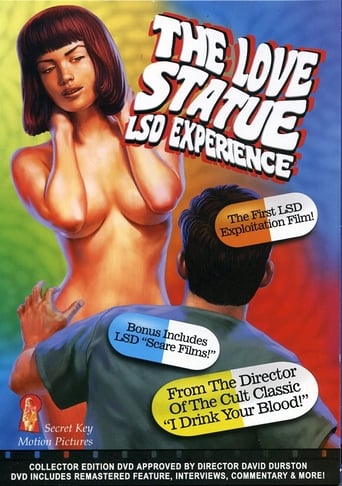BroadcastChic
Excellent, a Must See
Peereddi
I was totally surprised at how great this film.You could feel your paranoia rise as the film went on and as you gradually learned the details of the real situation.
Sameer Callahan
It really made me laugh, but for some moments I was tearing up because I could relate so much.
Myron Clemons
A film of deceptively outspoken contemporary relevance, this is cinema at its most alert, alarming and alive.
Woodyanders
Wimpy struggling Greenwich Village painter Tyler Westin (a decent performance by Peter Ratray) is in love with gorgeous, but mean and snippy cabaret dancer Lisa (a divinely bitchy portrayal by slinky brunette stunner Beti Seay), who treats Tyler like dirt and constantly belittles him. Sultry nightclub singer Mashiko (striking Japanese singer Hasako Tsukuba, who says all her dialogue in awkward phonetic English) turns Tyler on to LSD. After experiencing a nightmarish three day acid trip, Tyler returns to his shabby apartment to find Lisa murdered. Is Tyler responsible for her death? Or did someone else kill Lisa? While the premise certainly has potential, this low-budget oddity alas is seriously undermined by David E. Durston's pedestrian direction, a plodding pace, an often dull and uneventful narrative, an extremely weak, passive, and hence unsympathetic main character, a bungled conclusion at the New Croton Dam, and precious little in the way of nudity or soft-core sex (luscious Big Apple smut flick regular Gigi Darlene as the titular statue alas doesn't get to show much skin). Moreover, Tyler's bad acid trip is blandly visualized, with your generic distorted fish-eye lens stuff and shaky hand-held camera-work both failing to impress. On the plus side, Harvey Goldenberg enlivens things to a good extent with his funny turn as Tyler's jolly hipster sculptor buddy Stan, the jazzy score is pretty sweet, the authentically gritty location shooting at such places as the Bitter End, Central Park, and the Staten Island Ferry provides a neat time capsule of 60's New York, and the hopelessly dated hepcat slang articulated throughout is good for a few laughs. But overall this film is far too tame'n'tepid and thus rates as a strictly passable time-waster at best.
lor_
The late filmmaker David Durston has his own take on this early work, revealed in his interview & commentary material included in its DVD resurrection. But he seems a victim of self-delusion, as the movie doesn't match his aspirations.With a title (and subject) THE LOVE STATUE it is rather ludicrous for him to claim that it was a movie about drugs, in this case then-topical LSD, and not a sex movie. If your script is about a statue that the hero thinks (under LSD-inspired delusions) comes to life to make love with him, then we're solidly in sexploitation territory. The LSD angle, played up to a fare-thee-well by the video company packaging, is just a minor, unconvincing gimmick. And talking about making an art film influenced by European masters is pathetic when one views the actual result.The revived for video version omits the added sex scenes the producers demanded but that Durston refused to shoot himself (credited to genre journeyman Al Viola). So what we have is a poorly made, lacking in nudity skin flick with far more flaws, including a wholly unsatisfactory final reel, than virtues.Stage actor Peter Ratray chews the scenery as a stereotypical Greenwich Village artist living off a beautiful dancer (Beti Seay in the best performance, though also overplayed). His new sculptor roommate is a real oddball, limned by Harvey Goldenberg. It is interesting that in the AFI Catalog synopsis (published back in 1976) for the film his character's homosexuality is the key plot device, but that aspect is entirely missing from the DVD.Durston also unleashes a Japanese pop star Choko Tsukuba, in a much ado about nothing American debut. It reminded me of the parallel world of female Japanese jazz vocalists, take a '90s star like Keiko Lee for example, who look good on paper but are pretty embarrassing to listen to, even if accompanied by American jazz masters.The film's best element is the beautiful model for the statue that comes to life, credited under the pseudonym Nancy Norman (or is it local favorite Gigi Darlene -IMDb has the credits garbled). The fans deserved to see much more of whomever, however -maybe the missing additional photography footage delivers.Durston gives a detailed alibi, blaming the weatherman, for why the confusing ending of the film is so poor, but it is intrinsically bad. The set up scene for a final confrontation is bungled and unconvincing, so when the tacked on scene (shot upstate instead of in Central Park due to a snowstorm botching up the schedule) unfolds credibility has already been lost.I saw both of Durston's claims to fame, I DRINK YOUR BLOOD and STIGMA, in theaters back when they were new and wasn't impressed. He ended his film career cranking out gay porn which I haven't sat through, and I don't understand why he has a cult following at all.

